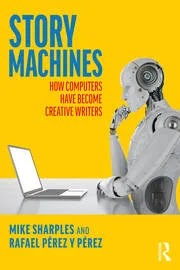
Story Machines, well worth a read by two experts in the field
Author: Donald Clark
Source
Can software create stories? In answering this question, two experts in the field unpack the history and issues around this idea. Good to read something on AI and creativity that is not the usual naïve, anthropomorphic, and dystopian utterances of people who do not have the background and balance to come at the subject objectively. That both authors have been involved in this domain for decades helps, as most see it as something that has just popped out of nowhere.
Delighted to see that they both worked with Margaret Boden, who I mention in my book AI for Learning. She explored in depth the deep relationship between cognition and technology. Mike and Rafael then get down to business with a few precursors. Great to see them also mention the wonderful John Clark and his Eureka machine for producing readable, but mostly nonsense[, Latin verse. We have largely forgotten that the machine age produced creative and learning machines throughout the 19th C leading to serious products by Pressy and Skinner in the early 20th century .They uncover the wonderful and forgotten history of storytelling machines well and in detail.
But it all springs into life when computing arrives. There are a few misfires but the wonderful David Cope is mentioned, more famous perhaps for his computer-generated music, but the story of story grammars and their limitations is interesting, then into GPT-2 and GPT-3. I’ve used both and they are, as they say, mind-blowing. They are also limited in what they can do, on word length, consistency of meaning and rational plots, so their impact is more likely to be felt in non-fiction , where the creation of content, summarisation, along with cheating in assignments, essays and assessments is already rife.
The book then deals with storytelling games. The possibilities within the Metaverse flooded into my mind, especially when combined with image generation, which will be possible with future generations of DALL-E and other text to image transformers . Video, however requires immense amounts of computing power. They are also spot on in unpacking the role of AI as Augmented Intelligence, where writers are in a dialectical relationship with the technology. We all have predictive text, spellcheckers, grammar checkers and so on, so the technology is already deeply embedded in the practice of almost all forms of writing. They even present their own Engagement-Reflection model and their own story generator. It had echoes of Skinner’s rather wonderful disc-based Teaching Machine.
One problem I have with the ‘storytelling’ debate is the lack of focus on what storytelling is. Some see it as some sort of universal grammar, present in all forms of language, which is ridiculous, others see it still fine grained at the level of linguistic features, such as the use of metaphors, some as short, stored narratives that we recall or tell to ourselves, others as full blown produced narratives with complex structures. So it was heartening to see Roger Schank’s ‘script’ theory mentioned up front . I don’t buy the idea that all language emerged from storytelling but it is clearly a universal and deep dimension of cognition and at a more general level, present all cultures.
I should add that I am not an uncritical fan of the cult of ‘storytelling’. I agree with Jonathon Gottschall in The Story Paradox that the most urgent question we can ask ourselves now is not ‘How can we change the world through stories?’ It may be ‘How can we save the world from stories?’ It is a given that stories are a force for good. That’s the orthodoxy. But what if the truth is that they are now a force for bad? Are we being drowned in a tsunami of stories from TED Talks, YouTube, TV, Movies, Netflix, Prime, Disney, Social Media? Could it be that they distract us from and distort reality? We love stories but only the stories that confirm our own convictions and we seek out those narratives that tell us what we already believe, retell and reinforce them, time and time again. And maybe the most subversive story, is the one we tell ourselves, over and over again, that we are right and those other storytellers and stories are wrong.
I was struck by the story about a story that came out recently in Human Kind by Rutger Bregman, who uncovered a real Lord of the Flies story about a group of boys actually marooned on an island for more than a year. Golding’s novel has been a staple in the school curriculum for decades but the real boys got on rather well and constructed a reasonable set of rules and society, until they were rescued.
Technology has given storytelling an immense boost. Box sets are consumed in a series of 6-13 episodes, then subsequent series released. Streaming services have exploded with Netflix, Prime, Disney, HBO and many others. They have huge amounts of archived content and release more than any individual could consume. We live in a blizzard of storytelling. The danger could be that machines will reinforce this pattern. They may, on the other hand, free us from our all-too-human prejudices embodied in much storytelling. Plato may have been right all along!
I liked their final words, on using a combination of AI tools to create stories and the idea that there is also something possible beyond human stories, stories that genuinely come from the space of the machine. We saw this recently with a Google researcher who was convinced that the transformer was sentient.
Hugely enjoyed this book as Mike and Rafael have opened the door wide for such a debate.
